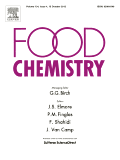
Food Chemistry
Scope & Guideline
Decoding the Secrets of Food Chemistry
Introduction
Aims and Scopes
- Food Composition and Nutritional Chemistry:
Research on the chemical composition of various food items, including macronutrients, micronutrients, and bioactive compounds, with a focus on how these components affect nutritional value and health benefits. - Food Safety and Quality Control:
Studies aimed at understanding the chemical factors affecting food safety, including the detection of contaminants, allergens, and residues, as well as the development of new methods to ensure food quality. - Food Processing and Technology:
Exploration of chemical reactions and transformations that occur during food processing, including thermal, non-thermal, and innovative processing techniques, aimed at improving food quality and shelf life. - Flavor Chemistry and Sensory Analysis:
Investigations into the chemical compounds responsible for flavor and aroma in foods, along with sensory evaluations to understand consumer preferences and perceptions. - Food Packaging and Preservation:
Research focused on the development of new packaging materials and methods that enhance food preservation while maintaining safety and sensory attributes. - Functional Foods and Nutraceuticals:
Exploration of functional foods that provide health benefits beyond basic nutrition, including the study of bioactive compounds and their mechanisms of action in human health.
Trending and Emerging
- Nanotechnology in Food Applications:
The integration of nanotechnology in food chemistry is rapidly growing, focusing on the development of nanocarriers for delivery of bioactive compounds, enhancing food safety, and improving nutritional profiles. - Sustainable and Green Chemistry:
There is a marked increase in research aimed at sustainability, including the use of green solvents, waste valorization, and eco-friendly extraction methods to enhance food quality and safety. - Metabolomics and Advanced Analytical Techniques:
The application of metabolomics, along with cutting-edge analytical techniques such as high-resolution mass spectrometry and machine learning, is on the rise for comprehensive profiling of food components and understanding their health impacts. - Gut Microbiome Interactions with Food Components:
Research exploring the interactions between food components and gut microbiota is gaining importance, particularly regarding the implications for health and disease management. - Bioactive Compounds and Functional Foods:
There is a growing emphasis on the identification and utilization of bioactive compounds in foods, aiming to develop functional foods that contribute to health promotion and disease prevention.
Declining or Waning
- Traditional Food Preservation Techniques:
Research focused on conventional methods of food preservation, such as canning and salting, appears to be declining as newer, more effective preservation technologies gain attention. - Basic Nutritional Studies:
Studies that solely focus on the basic nutritional composition of foods, without exploring the broader implications of food chemistry on health, are becoming less common as researchers shift towards functional and bioactive components. - Simple Sensory Evaluation Techniques:
Basic sensory evaluation methods are being overshadowed by more advanced and integrated approaches that utilize technology and multi-sensory analysis, leading to a decrease in traditional sensory studies.
Similar Journals
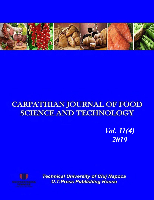
Carpathian Journal of Food Science and Technology
Pioneering Research in the Heart of Romania's Food ScienceCarpathian Journal of Food Science and Technology, a distinguished publication from the NORTH UNIV CENTER BAIA MARE, has been a pivotal platform for disseminating groundbreaking research in the field of food science since its inception in 2009. With an ISSN of 2066-6845 and an E-ISSN of 2344-5459, this Open Access journal aims to promote knowledge and innovation, offering unrestricted access to its content, thereby enhancing visibility for authors and facilitating a wider readership. Based in Romania, the journal plays a crucial role in advancing scientific inquiry within the agricultural and biological sciences, particularly focusing on contemporary food science issues. As it continues its convergence through 2024, the journal currently holds a Q4 ranking in the Food Science category, allowing it to carve out a unique niche within the academic community despite its current Scopus percentile ranking of 19th. Scholars, researchers, and students in the field will find the journal an invaluable resource for the latest advancements and discussions, making it an essential addition to their academic pursuits.

Food Chemistry: Molecular Sciences
Elevating Food Science through Molecular InsightsFood Chemistry: Molecular Sciences is a leading academic journal published by ELSEVIER, dedicated to advancing knowledge in the fields of food science and molecular biology. With an ISSN of 2666-5662, this journal is a key platform for researchers and professionals aiming to disseminate innovative research findings from 2020 through 2024. Recognized for its quality, it stands in the Q1 category for Food Science and Q2 for Molecular Biology as of 2023, showcasing its commitment to high-impact publications. The journal is indexed in Scopus, earning ranks of #98/389 (74th percentile) in Agricultural and Biological Sciences - Food Science and #214/410 (47th percentile) in Biochemistry, Genetics and Molecular Biology - Molecular Biology. Each article represents cutting-edge research that drives the understanding and application of molecular principles in food chemistry, making it an essential resource for anyone involved in the field. Although this journal does not offer open access, its rigorous peer-review process ensures that the content is reliable and of significant academic value, contributing profoundly to the body of knowledge in the respective disciplines. Located in Amsterdam, Netherlands, Food Chemistry: Molecular Sciences continues to inspire scholarly discussion and innovation within the scientific community.
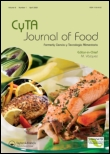
CyTA-Journal of Food
Connecting researchers to enhance global food systems.CyTA-Journal of Food is a prestigious academic journal published by TAYLOR & FRANCIS LTD, dedicated to advancing the field of food science and technology through the dissemination of innovative research and practical knowledge. With an ISSN of 1947-6337 and an E-ISSN of 1947-6345, this journal stands out with its strong impact factor and is currently placed in the Q2 quartile across multiple categories, including Chemical Engineering, Chemistry, and Food Science, making it a vital resource for researchers and professionals alike. The journal has been an integral part of the academic community since its inception in 2009, and continues to publish cutting-edge articles through to 2024. Its alignment with Scopus ranks further signifies its influence, notably achieving 67th percentile in Industrial and Manufacturing Engineering. As an Open Access journal, it ensures widespread accessibility to its valuable content, promoting collaboration and knowledge sharing among scientists, engineers, and students dedicated to enhancing food safety, quality, and sustainability.

Journal of Food Science and Technology-Ukraine
Enhancing Nutritional Quality Through Cutting-Edge ResearchJournal of Food Science and Technology-Ukraine, published by the Odesa National University of Technology, stands as a pivotal platform dedicated to the dissemination of high-quality research in the field of food science and technology. With its open access policy established in 2014, the journal fosters global knowledge sharing and accessibility, enabling researchers, professionals, and students to access critical findings and advancements in food technology without barriers. The journal's commitment to publishing innovative studies, reviews, and case analyses reinforces its role in addressing contemporary challenges in food safety, preservation, processing, and nutritional quality. With ISSN 2073-8684 and E-ISSN 2409-7004, it serves as a valuable resource for the academic community, supporting the advancement of food science knowledge and its practical applications.

International Food Research Journal
Cultivating Knowledge for a Sustainable Food FutureThe International Food Research Journal, published by UNIV PUTRA MALAYSIA PRESS, serves as a pivotal platform for disseminating innovative research within the field of food science. With an ISSN of 1985-4668 and an E-ISSN of 2231-7546, the journal has successfully established its presence since its inception in 2007, converging its findings through 2024. This esteemed journal holds a Q3 ranking in Food Science, illustrating its valuable contributions to the field as demonstrated by its Scopus rank of 276 out of 389, placing it in the 29th percentile among its peers in Agricultural and Biological Sciences. Although it operates under a traditional publishing model, its academic integrity and focus on high-quality research ensure that it remains a vital resource for researchers, professionals, and students eager to explore advances in food technology, nutrition, and safety. By encouraging interdisciplinary collaboration and critical dialogue, the International Food Research Journal plays an essential role in shaping the future of food science research.
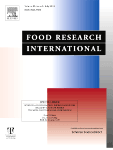
FOOD RESEARCH INTERNATIONAL
Uncovering Insights for a Sustainable Food FutureFOOD RESEARCH INTERNATIONAL is a premier academic journal published by ELSEVIER, specializing in the field of Food Science. With an impressive impact factor and ranked Q1 in the 2023 category quartiles, it stands at the forefront of research, positioned 17th out of 389 in the Scopus ranking for Agricultural and Biological Sciences, attaining a commendable 95th percentile. The journal publishes high-quality, peer-reviewed articles that cover a broad spectrum of topics, including food safety, quality control, nutrition, and biotechnology, making it an invaluable resource for academics, industry professionals, and students alike. As FOOD RESEARCH INTERNATIONAL seeks to enhance understanding and advance technologies related to food, it encourages innovative perspectives and interdisciplinary research. The journal, active from 1992 and continuing through 2024, is an essential platform for disseminating vital findings and fostering collaboration within the global food science community.

Food Quality and Safety
Shaping the future of food science through open access.Food Quality and Safety is a leading academic journal published by Oxford University Press, dedicated to advancing research in the critical field of food science. With an ISSN of 2399-1399 and an E-ISSN of 2399-1402, the journal has gained prestigious recognition, securing a Q1 ranking in the Food Science category as per Scopus rankings, and being positioned at #69 out of 389 in its field, reflecting its influence and reputation within the discipline. Since its transition to Open Access in 2017, the journal has broadened its reach, ensuring that cutting-edge research related to food quality, safety measures, and consumer protection is accessible to researchers, professionals, and students alike. With a commitment to publishing high-quality articles and reviews, the journal addresses contemporary challenges in the food industry and promotes a better understanding of food safety protocols. Based in Oxford, United Kingdom, Food Quality and Safety plays a pivotal role in shaping future research and practices in food science, making it an essential platform for scholars who aim to impact the industry through innovative findings and applied research.

CZECH JOURNAL OF FOOD SCIENCES
Transforming Food Systems Through Rigorous ResearchCzech Journal of Food Sciences is a premier publication in the field of food science, disseminating vital research since its inception in 1999 and transitioning to Open Access in 2007. Published by the Czech Academy Agricultural Sciences, this journal facilitates the exchange of knowledge among researchers, professionals, and students dedicated to advancing the understanding of food systems, safety, and technology. With an ISSN of 1212-1800 and an E-ISSN of 1805-9317, it holds a respectable position with a Q3 ranking in the Food Science category for 2023, illustrating its commitment to high-quality research despite its Scopus rank of 209 out of 389, situated in the 46th percentile. Located in the heart of the Czech Republic, at TESNOV 17, PRAGUE 117 05, this journal serves as an essential resource for those involved in agricultural and biological sciences, paving the way for innovative discoveries and applications in food science.

Journal of Food and Nutrition Research
Elevating Standards in Food and Nutrition ResearchJournal of Food and Nutrition Research, published by the VUP FOOD RESEARCH INST in Bratislava, Slovakia, serves as a vital platform for disseminating cutting-edge research in the fields of food science and nutrition. With an ISSN of 1336-8672 and an E-ISSN of 1338-4260, this journal emphasizes the importance of interdisciplinary approaches to address contemporary challenges related to food quality, dietary practices, and nutritional health. Notably recognized in the 2023 Scopus rankings, the journal is classified in Q3 quartiles for both Food Science and Nutrition & Dietetics, providing a forum for researchers aiming to enhance knowledge and practices within these domains. Those engaged in academia and industry will find the journal invaluable for its comprehensive scope, which covers novel food technologies, nutrition interventions, and the implications of dietary behaviors. Though not open access, the journal is dedicated to enriching the academic conversation and contributing to advancements in public health and nutrition policies.
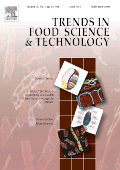
TRENDS IN FOOD SCIENCE & TECHNOLOGY
Elevating food science with cutting-edge insights.Trends in Food Science & Technology, published by Elsevier Science London, stands as a premier journal in the fields of food science and biotechnology. With an impressive Q1 ranking in both the food science and biotechnology categories, it is recognized for its rigorous peer-reviewed articles that advance knowledge and innovation in the sector. The journal’s Scopus rankings validate its significance, placing it in the top percentile among its peers, with a remarkable rank of #2 out of 389 in Agricultural and Biological Sciences - Food Science, and #4 out of 311 in Biochemistry, Genetics, and Molecular Biology - Biotechnology. Since its inception in 1990, the journal has become a vital resource for researchers, professionals, and students alike, offering insights into contemporary challenges and trends impacting food technology. Although it operates under a subscription model, the quality of research published within its pages makes it an essential read for anyone involved in advancing the science of food.